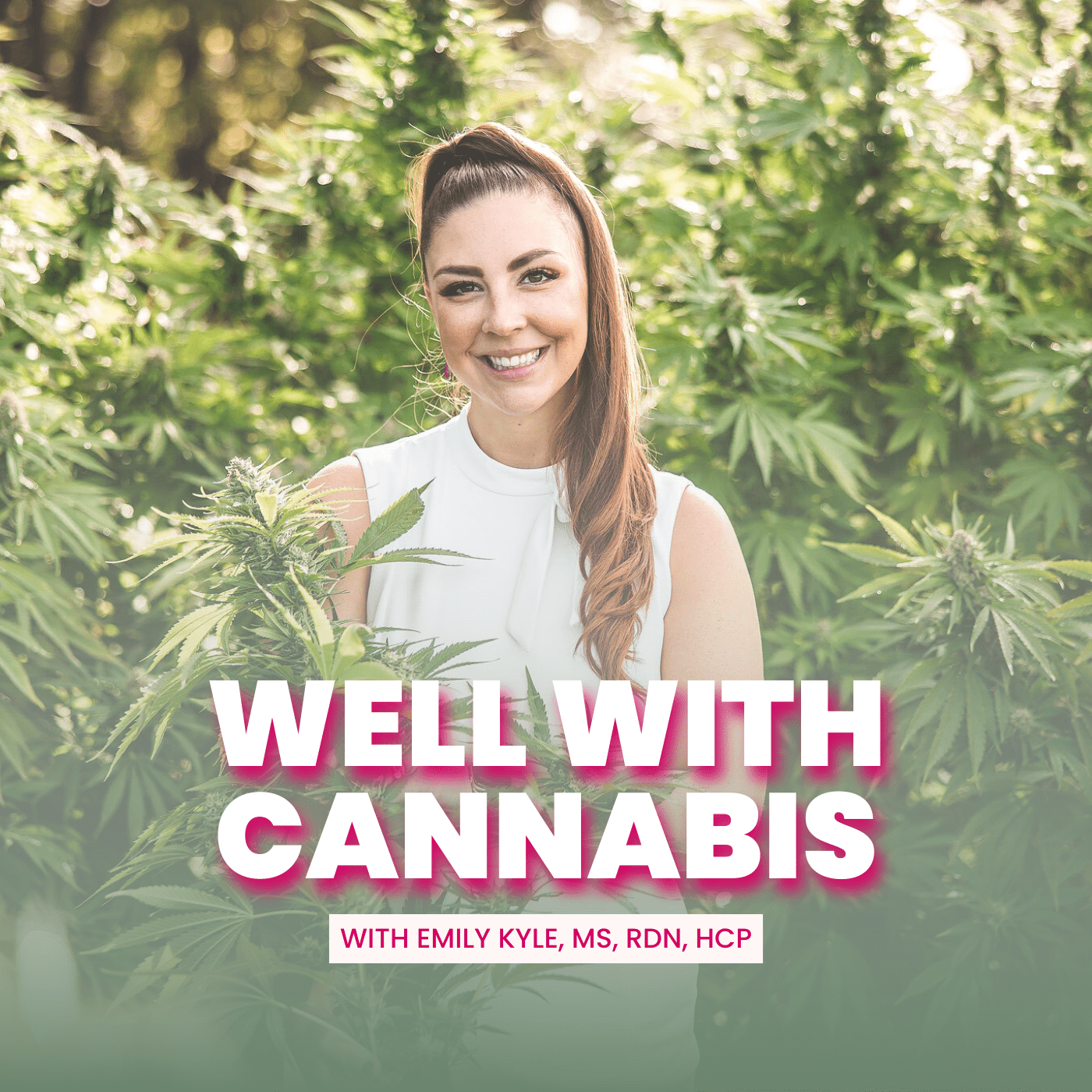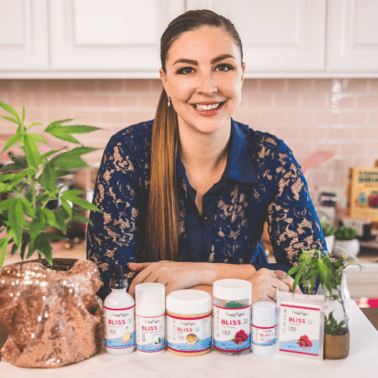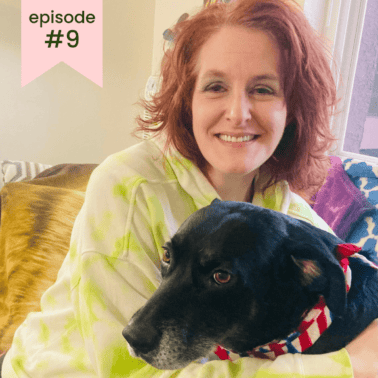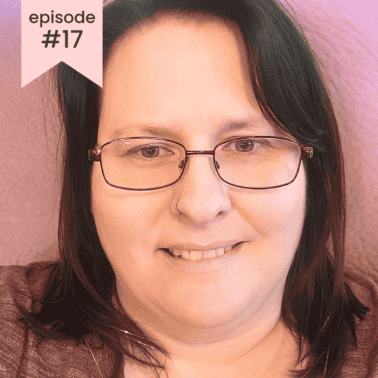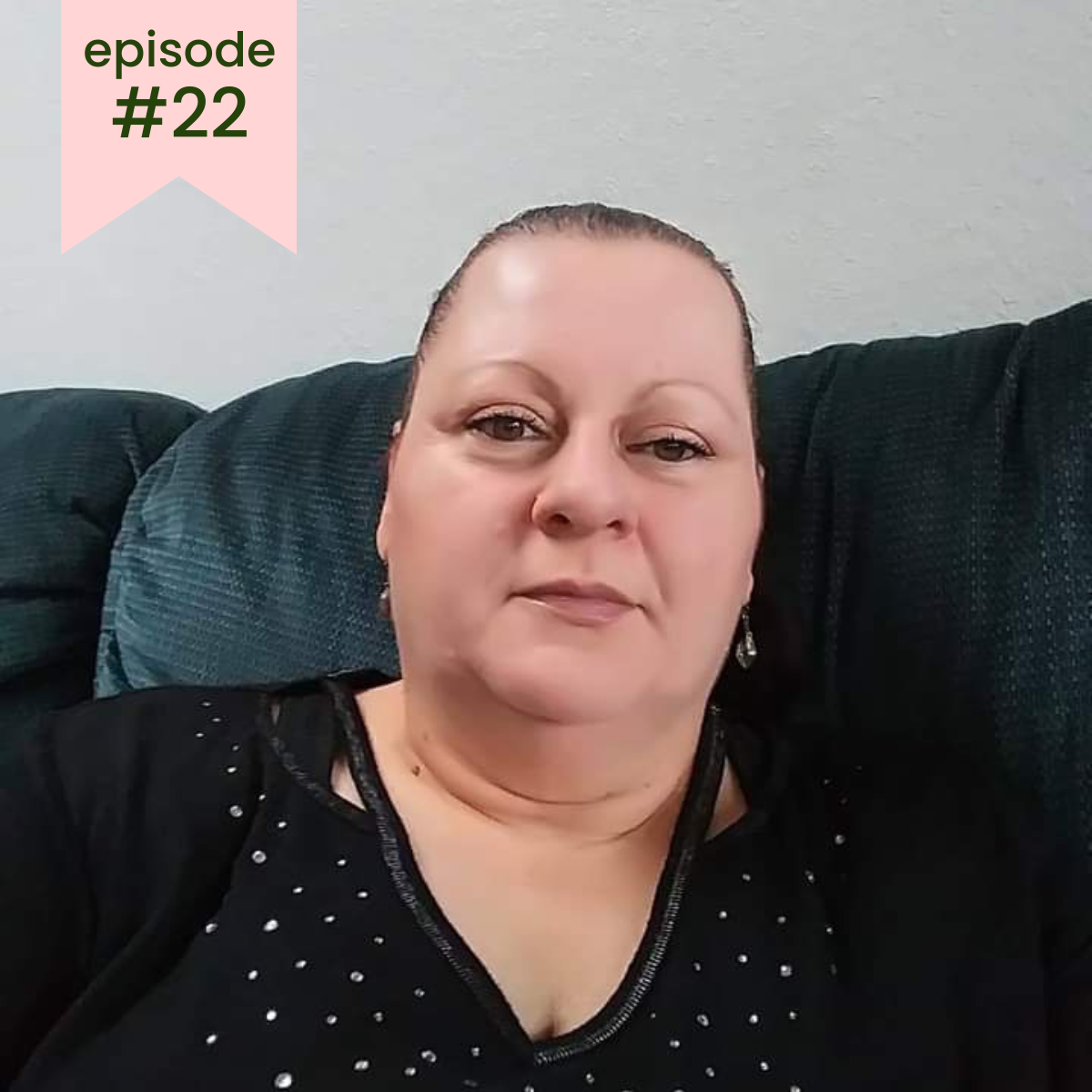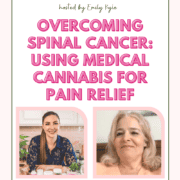Join me in this episode for an inspiring conversation about overcoming chronic pain, dealing with spinal cancer, and finding hope in the face of adversity. Our guest, Jeanne, shares her journey of healing with cannabis after being on over 15 pharmaceuticals. We discuss the benefits of using cannabis for pain management, breaking the stigma around it, and advocating for oneself when navigating the healthcare system.
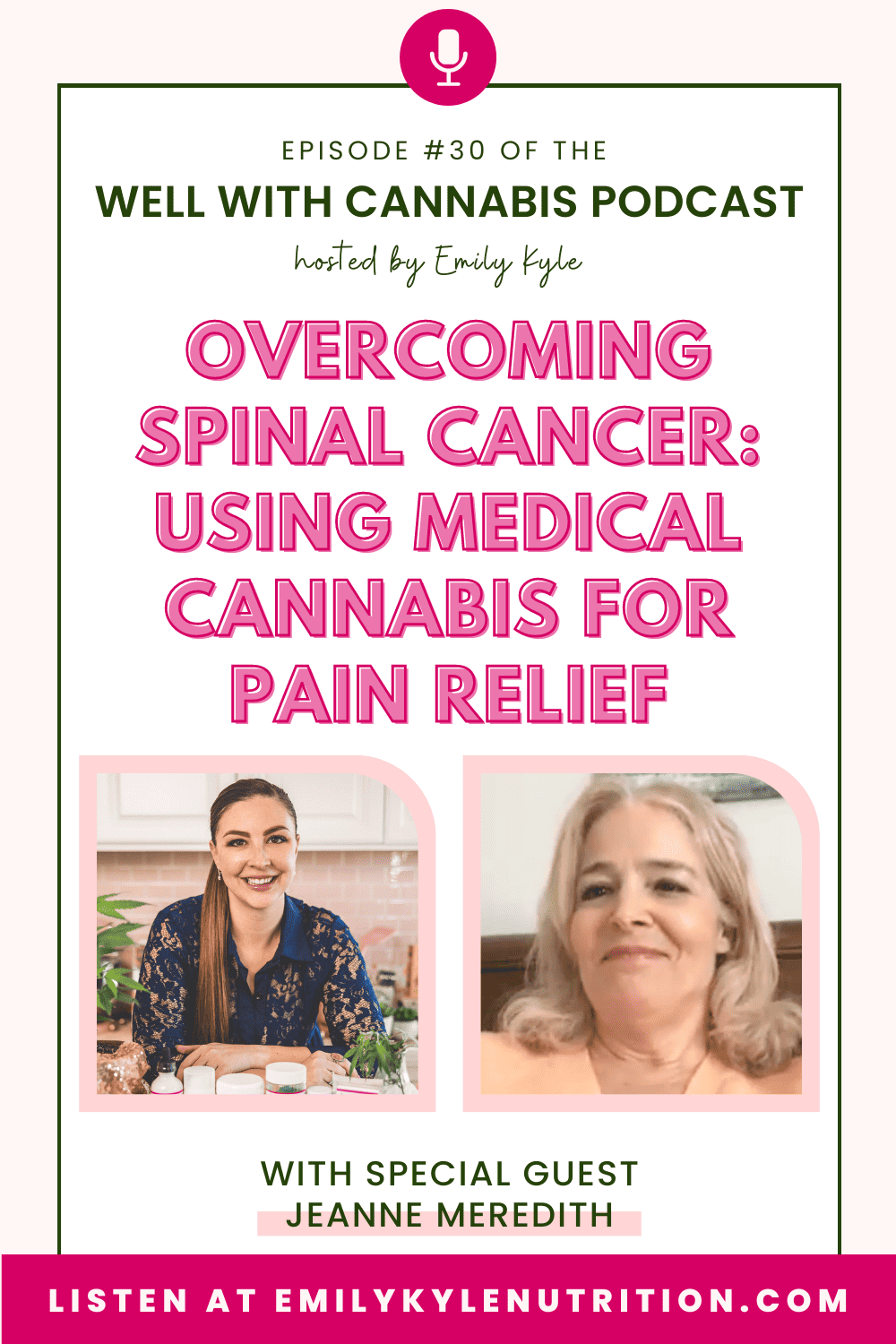
Table of Contents
Features
- Release Date: Monday, July 10, 2023
- Episode Number: Season 1, Episode 30
- Special Guest: Jeanne Meredith
Listen To The Episode
Click the play button above to listen to the episode.
Listen to all podcast episodes →
Why You Will Love This Episode
In the latest episode of our podcast, we sit down with Jeanne Meredith, a remarkable woman who has been through an incredible journey. In 1994, Jeanne was diagnosed with an ependymoma, a type of spinal cord tumor. The surgery to remove the tumor left her unable to walk, and she had to learn how to walk again.
Fast forward to 2008, and Jeanne had another surgery, this time a spinal fusion with plates and hardware. Unfortunately, that was not the end of her troubles. In 2015, she had to have part of the hardware removed due to complications. During this time, Jeanne found herself in “pain management” and was on over 15 pharmaceuticals, including fentanyl patches and oxycontin.
However, in 2018, Jeanne made the decision to try medical cannabis, and it turned out to be the best decision of her life. She’s now off all pharmaceuticals and is happier and healthier than ever before.
In this episode, Jeanne shares her experiences of dealing with chronic pain and how she was able to overcome it with the help of medical cannabis. She talks about the stigma surrounding cannabis, how it’s changing, and the benefits of using cannabis for pain management.
Jeanne also shares her thoughts on the importance of advocating for yourself when dealing with chronic pain and navigating the healthcare system.
This is an inspiring conversation that will leave you feeling hopeful and empowered. Join us as we talk to Jeanne about her journey from spinal cancer and chronic pain to a new life filled with health and happiness.
Related Episodes
Articles & How-To Guides
Cannabis for Pain Relief: Does It Work?
Podcast Episodes
From Chronic Pain Survivor to Passionate Cannabis Advocate
Podcast Episodes
Homeschooling Mom Finds Pain & Anxiety Relief with Cannabis
Full Transcript
Jeanne: Now I want to do things, I want to be with people, I want to be around. I don’t feel miserable all the time. I feel joyous. That’s been the biggest change, and I know that I wouldn’t be the happy, great-feeling person that I am now, and that’s what’s made a huge difference. I actually feel good. Even though you’re in pain sometimes, it’s such a different journey when you’re on cannabis. You can handle it better.
Announcer: Welcome to the Well With Cannabis Podcast, a show dedicated to telling the life-changing stories of those who live well with cannabis all while teaching you how to do the same. Meet your host, Emily Kyle, a registered dietitian nutritionist turned certified holistic cannabis practitioner. Emily changed her life for the better with the help of the cannabis plant, and now she’s committed to helping others do the same.
Tune in each week to hear heartwarming stories and gain the knowledge you need to feel connected, inspired, and supported on your own cannabis journey. Whether you’re a new cannabis consumer or a lifetime lover, you’ll benefit from these uplifting tales of real-life journeys that will show you how you, too, can live your best life well with cannabis.
Disclaimer: Hi there. Before we jump into today’s episode, I wanted to share a note on potentially sensitive content. The episodes on the Well With Cannabis Podcast are created for adult audiences only. We will, at times, cover sensitive topics, including but not limited to suicide, abuse, mental illness, sex, drugs, alcohol, psychedelics, and the obvious use of plant medicine. Explicit language may be used occasionally. Please refrain from watching or listening to the show if you’re likely to be offended or adversely impacted by any of these topics.
The information on this show is for informational and educational purposes only. It does not constitute medical advice. If any of the content on this podcast has brought up anything for you, please reach out or speak to a professional or someone you trust.
Emily: Hello, and welcome to another episode of the Well With Cannabis podcast. I am so excited. We have a special guest here today, our friend, Jeannie Meredith. Welcome. Thank you so much for joining us.
Jeanne: Thank you for having me. I’m so excited to get started on sharing my story with people.
Emily: I can’t wait to hear your story. It sounds like something happened in 1994. Take us all the way back. What happened then?
Jeanne: I was in a car accident, and a year later I was still seeing a TMJ doctor and an orthopedic doctor. The TMJ doctor felt like they were missing something and that I needed an MRI. He and I became personal and just talked about things, and I shared with him what was going on. I went to the orthopedic doctor and told him we needed to do an MRI.
Jeanne: And he said, “I don’t think so. I think all you want is pain medication.”
Jeanne: I said, “No. I’m a 29-year-old mother. I have a three-year-old and a four-year-old at home. I’m seeing another doctor, and he feels I need to have done this because we’re missing something.” A few days later, they did an MRI.
Jeanne: I was called from the orthopedic doctor’s office within hours. And they said, “You need to call this doctor. Let me give you this information.”
Jeanne: I called them, and they said, “You need to set up an appointment to come in. How about tomorrow?”
Jeanne: So, we set up an appointment. They didn’t tell me anything else. It was in Towson, Maryland. I lived 15 minutes away. I was a young mom; my kids were three and four at the time. I remember I had a preschool outing with my daughter that I had signed up for. So I called the doctor’s office back, and I told them I needed to reschedule.
Jeanne: They said, “We need to be honest with you. You cannot miss this appointment. Get somebody else to take your daughter, and you come to the appointment with someone.” I was just 29 years old, and nothing was wrong with me. I just figured they couldn’t fit me in any other time.
Jeanne: So my mother-in-law went with my daughter, and my mother went with me. When we got to the doctor’s appointment – and this is something that will always stick with me – he proceeded to examine me, stick needles in my legs, did all these kinds of things, and he said, “You do understand you have something gravely wrong with you?” And I asked what. He said, “Get dressed; we’ll talk in the other room.”
Jeanne: When I walked into the other room, I saw that he had a desk with two chairs right in front of his desk. When he walked in, he separated the two chairs and pulled one behind the other. I told him that I wanted to sit next to my mother, but he told me to leave the chairs where they were. As he pulled out the MRIs, he started to explain to me that I had a tumor inside my spinal cord, and if they didn’t remove it, I would be paralyzed within six months.
Jeanne: He told me that this tumor had been growing in my body since I was born. I had symptoms like tripping up the steps, numbness, and tingling, but I had gotten used to them. I figured I was clumsy and grew used to having these things with me.
Jeanne: Then he told me that there were only two doctors in the United States that would do surgery. One was in this office; the other was in New York. The doctor that was in this office was in Florida at the time, but he was a neonatal doctor used to dealing with tiny humans, which was why he was able to remove the tumor growing in my spinal cord.
Jeanne: This was in December, and they wanted to do the surgery immediately, but thankfully I waited and went in on January 6th, 1994. My sister had been a nurse and understood that it didn’t need to come out before Christmas. She recommended that I spend Christmas with my kids because we didn’t know how long the recovery would be. Why ruin Christmas when I could wait another week or two?
Jeanne: And she was absolutely right. So I did. I can remember when they woke me up. I don’t remember them waking me up, but the first time they stood me up, just like you see on tv with the parallel bars and me in a wheelchair.
Jeanne: The guy across the parallel bars attached to me tells me to stand up, and I collapsed because I had no feeling from my waist down. I cried, and I asked him to put me back in bed. I had kids, and thankfully, my ex-husband brought my babies in to visit and told me that I had to get up and be there for my babies.
Jeanne: That was my turning point. I knew that I had to get up out of that bed, and I had to work. It was a long recovery, and now it’s 20-some years later, and I’ve had three more back surgeries. I had to have a flexible fusion done, a plate put in me, and four or five bolts and screws in my lower back. I have spinal stenosis, myelopathy, and deterioration. I did learn to walk again. I can’t run or dance, but I can walk.
Emily: It’s a miracle. I’m so happy.
Jeanne: It’s been incredible, and, as I said, my kids were huge in that and being with me all of those years and in me having gone through four surgeries. I was ready in 2018. I’m probably rushing my story. I jumped from 1994 to 2018. During all that time, I had several other surgeries.
Jeanne: I was seeing pain management. I was on over 20 prescriptions, including Fentanyl patches, Oxycontin, Cymbalta, Trazodone, Lyrica, and Gabapentin. I thought the number of medications I was on, and living was unbelievable. I still wore a back brace every day. I wore lidocaine patches, and I was still going to the pain management doctor every six months getting injections in my spinal cord on top of all those medications.
Jeanne: Then the doctors recommended that they put in a spinal cord stimulator. I was living in Maryland at the time, and my kids were in North Carolina. They told me that I didn’t need another surgery and asked me to look into medical cannabis. I had never even thought about it. It had never crossed my mind.
Jeanne: My daughter and I weren’t close at the time because she didn’t like the person that I was. I was not a nice person. I was cranky all the time; I was short-tempered; I was miserable. On top of that, the medications that I took around my grandkids could kill them. I wore fentanyl patches in bed with my grandbabies, and my daughter had to ask me what the hell I was doing because I didn’t think about it.
Jeanne: I had to take a lockbox and keep it out in the garage because she had found pills in the house that I had inadvertently dropped – and I don’t blame her. So she was very cautious when Mimi was around, and she was on edge, and I was on edge, and it was just not a good situation. So when she said, “Mom, try the medical cannabis,” thankfully, it had just become legal in Maryland dispensaries.
Jeanne: I had just started seeing a new primary care doctor in another area of Maryland, where my then-boyfriend (now husband) was living. The doctor and the pharmacist asked what I was doing on all those medications.
Jeanne: And here I thought it was okay.
Emily: The doctor prescribed it.
Jeanne: Exactly! My daughter was pregnant with the fourth grandchild, and I decided by August 2018 that I wanted to be off of everything. And I was. It was tough.
Jeanne: I didn’t know about the endocannabinoid system. Dispensaries were just getting started, and I’ve learned so much since then. And gosh, I am so healthy, happy, and energetic, and I run around and am with the grandkids all the time. My daughter can’t have me down there often enough. It’s just been incredible. Incredible.
Emily: Oh my gosh, I’m so happy for you!
Jeanne: It’s been incredible. I guess I didn’t realize I thought I was living. And I thought I was okay, and I thought I was an alright person. And now, when I look back, I wish I could have done this 30 years ago.
Jeanne: We’re now in Virginia. My husband and I are in a 55 and older community, and I tell everybody,
Emily: Oh my gosh, really? I love that!
Jeanne: Everybody here knows that I use cannabis, and I don’t care because I am a happy person. And it’s funny because when I first moved here, I planned to post it on the website so everybody knows.
Jeanne: And then I thought that they all needed to meet me first because people don’t understand. They think you’re stoned. And then they meet me, and it’s okay. We’ve lived here for almost three years now, so everybody knows.
Jeanne: And I’m growing now because growing in Virginia is legal.
Emily: That’s amazing!
Jeanne: I’ve come a long way. Yes.
Emily: Let’s talk a little about this decision to use cannabis. Your daughter suggested it. Did you immediately try it? Were you doing research?
Jeanne: I had always used cannabis. In high school, it was just something we did. We got high. I don’t think I went to high school once, and I wasn’t high. And it’s weird. I went to a small private Catholic High school, and looking back, that’s what helped me get through the day. I don’t know if it was anxiety or something else, but I was a straight-A student, pretty much. Looking back, I realize I was using it medicinally and didn’t know it.
Emily: Absolutely. So do you remember being on the medications and trying it, or did you wait till you were off the medications to try it?
Jeanne: I stopped using cannabis when I had kids. I started smoking again and taking the prescription medications initially, but it was not from the dispensary. I had someone I was able to go to.
Jeanne: When the doctors wanted me to use the spinal cord stimulator and my daughter mentioned medical cannabis, I realized that I was already using cannabis. I was smoking a bowl now and then, and I started to think that maybe there was something to this medical cannabis idea.
Jeanne: I started to taper off all my medications. I went to the medical dispensary. I went to my pain management doctor and told him what I wanted to do.
Emily: How was the pain management clinic? How did they take it?
Jeanne: They said they would be willing to help me titrate off my medications, but they could no longer prescribe anything for me.
Emily: Because no one can see me, my jaw dropped. That is so mean.
Jeanne: Right.
Emily: That’s what they tell you? They say, “If you’re going to use cannabis, bye. We’ll never see you again.”
Jeanne: Pretty much. Because they test you once they test you and you have any illegal drug in your system, they can no longer prescribe.
Emily: Oh my gosh, that’s horrible.
Jeanne: Yes.
Emily: It’s so mean to a patient when you’re just experimenting. You’re not sure if it’s going to work for you or not. That gives you no room for trial and error. So how did you feel after that?
Jeanne: I mean, I had been going to them for over 15 years.
Emily: It’s so mean!
Jeanne: Yes. And they said that cannabis is federally illegal. They admitted to me that one other patient went off of everything and went on Marinol, the prescribed synthetic version. But I did not want to go on anything that I had to get pharmaceutically; I wanted to try everything that was natural. I could only get a 30-day supply of medications from the pain management clinic. Once I said I wanted to try cannabis, they worked with me to get off of everything, and I think I was done there within three months.
Emily: How was the experience tapering off?
Jeanne: It sucked. I went through withdrawal.
Emily: Do they support you through that, or did they send you home and leave you alone?
Jeanne: No. I had no support from them. No. I don’t know if they would have prescribed anything if I had reached out to them. I went to the cannabis dispensary, told them what I was doing, and they suggested a 100 mg THC pill. Now I’m down when I make my edibles; I take 10mg.
Jeanne: I did get down off that high of a dose. But I felt that I needed that initial dose, but I didn’t feel stoned off of that. It helped me with the withdrawal pain.
Jeanne: In 2018, the dispensaries were just getting started, so I had to learn a lot on my own. And that’s where we’ve learned so much just by following you and your sites in three or four years. Now I make my own CBD and CBG oil.
Jeanne: I use CBDA; I decarb some and because the CBDA molecule is also healthy beneficial, the same way with CBG. I use the THC, and I grow my own. I also get some from the dispensary and make my own gummies and chocolates. I take all of them individually, separately, so then I can figure out how my body interacts and what’s working for me.
Emily: This is amazing. I can’t believe you were able to get off 20 prescription medications successfully.
Jeanne: I’m not in pain anymore! I mean, with all of that crap that they had me on, I was still miserable and in pain. And then, on top of that, I was lucky if I went to the bathroom twice a month!
Jeanne: My bowels were a mess. Then I had dry eyes because of all the medications, so I had to see an eye specialist. Then they were talking about putting me on a CPAP machine because my breathing was affected because of all the opioids that I was on; my teeth were all bad. None of that happens anymore. I don’t have to see an eye specialist; I don’t have stomach issues.
Emily: It’s amazing. It’s incredible that you chose to use one single plant, yet it has had all these effects.
Jeanne: It’s been incredible. And like I said, with me living in the 55 and older community, these people need to know that you don’t need the pharmaceuticals and all that.
Jeanne: How can you not watch TV and not see a pharmaceutical commercial? All the side effects, oh my goodness!
Emily: Including death! And some of them are random, like “tearing of the perineum,” and you’re like, “Excuse me, what’s happening here?” And yet we listen to those every day when we’re eating dinner; our kids listen to those like it’s something normal, like it’s something we should accept.
Jeanne: Exactly. I mentioned my daughter has four children. They’ve been here. They see my cannabis plants; they see me vape. They’ve seen my oils, my gummies. They know that it is Mimi’s medication. and that is, I don’t hide it from them. During Covid, my mask said, ‘Cannabis saves lives’.
Jeanne: And I went everywhere with my grandkids, MRIs, and medical doctors, and it just started up conversations. That’s what we need to do to share with people how healthy this plant is and how incredible your life can be. Just here in my own neighborhood, I’ve helped people.
Jeanne: Because you don’t know. You go to any store and get CBD, and it may not have any CBD in it; you don’t know. And then all the other crap that they put in it. So when I met a few people who said they’d tried it and it didn’t work, I asked them where they got it. So then I started processing my own oils here, and now I share them with people in my neighborhood.
Jeanne: I make little vials up and tell them to give it 30 days. That way, if they tell me it doesn’t work, I know that they’ve truly tried cannabis. And I only make the CBD oil and the CBG oil and I include the A molecules because most people don’t need the THC.
Jeanne: Many people are still working, it’s still federally illegal, they’re older, they have the stigma, those kinds of things. They don’t need THC. They can try the CBD first and see if it works.
Jeanne: People offer to pay me for it, but I don’t want to be paid. I want them to try it. I want you to see if it helps them. Then there are places around here where they can buy it. There are pharmacies; there are good places online that I can recommend. It has helped everyone who has stuck with it.
Emily: I was going to ask you to tell me a few success stories. How has that gone for you?
Jeanne: As a matter of fact, I had two people in my kitchen yesterday coming to get some from me here in the neighborhood.
Emily: Oh my gosh. It’s exciting!
Jeanne: One lady was ready to have a knee replacement a year ago. She couldn’t sleep at night. She couldn’t take walks. She said she’d wake up in the middle of the night and couldn’t roll over. She would have to pick her leg up and physically move it. She has no pain now. She’s been taking just oils for a whole year. The CBD and the CBG, both of them every day for a year now.
Jeanne: My other neighbor, was getting some and trying it with her dog. Her dog stopped limping.
Emily: That has to feel so good that you can share that with others.
Jeanne: That’s my joy to share with others because my journey’s just been incredible.
Jeanne: The difference in my world has just been amazing. Just amazing.
Emily: Oh, I’m so happy for you.
Jeanne: Not only just with my daughter and my grandkids. My husband that I’m married to now, we’re coming up on our five-year anniversary. He married me when I was on all the medications.
Emily: So he’s seen the whole transformation.
Jeanne: Yes. He’s been through the whole transformation.
Emily: I’ll bet he’s happy too.
Jeanne: Oh, most definitely. Yes. Yes. He didn’t realize how good I could be.
Emily: Exactly. And how are things with your daughter? I know you said that they’re better, but tell us a little bit about how that’s gone.
Jeanne: I used to live in Maryland and it was about a six hour drive to the kids, and I was lucky if I saw them three or four times a year probably. She tolerated me. I guess that’s the best way to put it. And I don’t blame her. When I look back, I didn’t think about all the repercussions my world was having on her world. Not only her, but her children.
Jeanne: I wasn’t aware of it, but people were aware that I was on medication. When I first met my husband, it was six months after my most recent surgery in 2015, and I was still on fentanyl patches and all kinds of medications, and his daughter was concerned about the kind of woman (me) he was getting involved with. I didn’t even realize she had noticed. So that had a huge influence on me finally deciding to come off of it too, because I had heard it from my kids, obviously, and I’d heard it from my own family, but then when I heard it from somebody else that I cared about in his child and through her eyes I thought that maybe there was something there that I wasn’t seeing. So with that in the back of my mind, when my daughter mentioned trying cannabis, I realized that this was my way out. I could try something different, even though it was scary. And that’s what I tell people, especially when you are on such a host of medications.
Emily: I can’t imagine how scary that is.
Jeanne: But I’ll tell you, the best day in that timeframe was taking all my medications to the local police station, where they had a pharmaceutical drop-off. I had cases of stuff. It was crazy! I got all of the old medications together, took pictures, and dropped them off at the police station. I was like, “I am done.”
Emily: That had to have been such a proud moment for you.
Jeanne: Yes. It was awesome. Yes, it was. I sent the pictures to my family.
Emily: You are such an inspiration. Do you know how many people listening to this could hear this, and their lives could be changed like yours?
Jeanne: That’s why I’m sharing this with you, Emily. People need to know that we have been lied to. We’ve been lied to.
Jeanne: When I walk in places with my ‘cannabis saves lives’ mask, like to get my mammogram done and this and that, and people give me a weird look, and I’m like, “You know what? It’s really healthy for you. Have you ever heard about the endocannabinoid system?” And people are like, “The what?” And once you learn about the endocannabinoid system, it’s, “Holy heck. How come we didn’t use it? They knew it. They just didn’t tell us.” It’s learning about it…
Emily: It sparks that, that joy for education. You’re like, “I have to learn more.”
Jeanne: Yes. I share it with everybody. I have special links saved on my phone, and I share articles and tell people to start with the endocannabinoid system.
Jeanne: Once you start with that, and you learn that that’s what’s in your body. Everybody has an endocannabinoid system. Everybody’s body is regulated by an endocannabinoid system, and that’s why it works synergistically with our body to put it in homeostasis. And people are like, “What?”
Emily: And you’re like, “I just gave you this secret to life, actually.”
Jeanne: Exactly. Try it.
Emily: Yes. Now as you’re out and about in the world talking about it, do you feel any shame or stigma, or are you just way past that now?
Jeanne: No, I’m way past that.
Emily: Oh, I’m so happy. Did you ever feel like it at one point?
Jeanne: Yes, most definitely. I have stickers on my car, and if I pull up next to a policeman, I’m still wondering what he’s thinking of me. Now that I’m pushing 60, to hell with that. I think that age helps too. Because I’m not a young child anymore, I’m a grown woman, almost 60 years old; I think people tend to listen a little bit more. They’re more likely to consider that I might have something to tell them. So absolutely. I think that helps for sure too. And I’m sure you know. You’re young, a lot younger than me, and I’m sure you’ve also dealt with that stigma.
Emily: There comes a point, though, where, just like you said, where you don’t care. I literally don’t care. Once you see the light. And nothing else really matters.
Jeanne: Exactly.
Emily: It’s not like anyone could ever say something so hurtful to get me to stop using cannabis. And I’m like, “You need cannabis.”
Jeanne: Our community has different events. One time we were at a Christmas party there, and I was talking about using cannabis with one of my neighbors. She replied that she wasn’t going to judge me, and I said, “I don’t care if you judge me.” She looked at me. Then I told her I know how much it’s helped me, and I’d be happy to share with her if she knew. She just looked and did a double-take.
Emily: It’s so good though. It’s good to snap people out of that and make them think for a second and realize that there actually is no reason to judge you because you’re using cannabis – because look how amazing your life is right now.
Jeanne: Exactly. And they all drink.
Emily: That’s a whole other thing. Yes. Nobody judges anybody for drinking, but…
Jeanne: Exactly. And when I started here in Virginia, I had already been on medical cannabis and I started with a new primary care doctor. It was during Covid and I walked in wearing my ‘cannabis saves lives’ mask.
Emily: I love that you rocked that during Covid. That’s amazing.
Jeanne: Oh, most definitely. I even went and got my Covid shot with it on.
Emily:That’s awesome.
Jeanne: That was in a big auditorium. But, so I’ve enlightened this doctor’s staff as well.
Emily: Tell me more about that, because it’s what you do.
Jeanne: It is, and I started, like I said, in Maryland. My primary care doctor in Maryland obviously saw my journey and saw me going from being on 20 pharmaceuticals to none.
Emily: And did they ever say anything about that?
Jeanne: Oh yes. And then, because I moved from one area of Maryland to another, I went back to my GYN whom I hadn’t seen for 10 years. I had gotten remarried and I went in and they put me in the office and he walks in and he goes, oh,”Mrs. Meredith, don’t I know you? You, you look familiar.” I told him that I used to be Jeanne Alessi and that I was using cannabis. He didn’t know much about it and asked for some information. I told him about my journey. Then he started prescribing. He got his license in Maryland and started prescribing because of seeing the difference it had made in me. It was incredible.
Emily: That’s amazing. You’re just changing like life after life, just sharing your story. That’s why I’m so thankful that you are doing that here with us. I cannot wait for people to listen to this! Think about how many people are on that pharmaceutical hamster wheel, and if they can hear you be so successful and live this vibrant life afterward, then it gives them hope that they can, too.
Jeanne: Most definitely.
Jeanne: And the main thing is, stick with it. It can be frustrating, and you have to find what works for your body. That’s the most frustrating part with cannabis because it’s not a one-and-done thing. You need to figure out what works for you and your body. That’s difficult, but oh my gosh, it’s so much healthier.
Jeanne: And to not, just going to, being on Oxycontin and the whole stigma with that. The last couple of years that I had to go to the pharmacy and get the prescriptions filled, I felt like a drug addict. Which, I guess, in reality, I was. Do you know what I’m saying?
Emily: But it was doctor approved.
Jeanne: But still, because of everything coming, I don’t have that anymore. I don’t have to go and find my medications or go and stand in line. Now I grow right here in my house.
Emily: It’s beautiful. And I don’t know if you’ve had the same experience, but growing a plant for the first time is just magical in and of itself.
Jeanne: Oh yes. It’s been awesome.
Emily: How was your first grow experience?
Jeanne: I was so, so lucky. We have a local RVA cannabis dispensary here that only does CBD and I got my tent, the whole kit and caboodle from him. Even the dirt. Everything.
Emily: So you got everything that easy? You just walked in and said, “I need everything,” and that was it.
Jeanne: Yes. Yes.
Emily: Awesome. That’s crazy.
Jeanne: Yes. This is incredible. I know I paid a little bit more. He’s a small mom-and-pop shop, and I said, “As long as I can come in here with questions.” And he said that was fine. It made it so easy. I wound up with three plants. We can have four here in Virginia. I wound up with three plants. It was like four and a half to five ounces between three plants.
Emily: That’s so exciting. Congratulations.
Jeanne: Thank you. And then I had a trim party with my neighbors.
Emily: How fun! I bet they loved it.
Jeanne: They did. They did. So it’s been fun.
Emily: I feel like it turns into its own hobby after a while. And then cooking is a whole hobby in itself too.
Jeanne: It is. Yep. Yep. You can get into so much. Look, I stick with the easy stuff.
Emily: It’s fun to experiment with, and I’m so glad that you said to be willing to experiment because so much of cannabis is trial and error, trial and error, and being willing to keep experimenting because we don’t always need the same thing every day. Different things affect us differently, different dosages and different strains, and we change too daily, weekly, or yearly. And just being willing to go along on the journey, go with the flow, and know that it’s not always going to be perfect, but being willing to experiment is the best advice.
Jeanne: And I find I switch up strains. I make gummies and chocolates, and I probably have 10 different strains of gummies and chocolates in my refrigerator, and I switch them up because I have found that I get used to certain things.
Emily: Yes, absolutely.
Jeanne: If I just, if I take Northern Lights at night for 30 days, by the 30th day, it’s not working near as well as it did on the first day of the month.
Emily: Yes.
Jeanne: So I tend to switch it up too. And just doing that and incorporating the CBD and CBG has helped. There are days when I don’t even need a THC gummy.
Jeanne: You don’t have to have that every day. And just figuring out, like you said, what works for you is the most difficult because you can’t just walk into a store and say, “Okay, I have X, Y, and Z wrong with me. Hand me over what’s gonna work for me.” And that’s what we are so used to. We need to get out of that and listen to our bodies.
Jeanne: And that’s what’s been another huge part of my journey, going off all the medications and now being so aware of my body and aware and in tune with my body. I now go to a chiropractor. I go faithfully every week. I go to a massage therapist. I go at least every month if not every two to three weeks. And that, incorporated with cannabis, has also helped me. It’s all-natural. Of course, I am in that office preaching my journey to people too.
Emily: I love it. You are spreading it all over. I just can’t even imagine how many people have been affected by your story. And then now, hopefully, we’ll get even more. A broader audience.
Jeanne: I’m so glad you are doing this, Emily, so that we can share this story with people.
Emily: People need to hear your story. It’s incredible.
Jeanne: People need to hear how healthy they can live. Yes.
Emily: Yes. Now, I want to be respectful of your time. This has been an amazing interview. I will wrap up with the four questions I ask my guests. Are you ready?
Jeanne: Okay.
Emily: Okay. First one. What are you most proud of in your life to date?
Jeanne: Going off all of the pharmaceuticals.
Emily: That is a feat in and of itself. I am so proud of you. I can’t even imagine what it’s like going through that. And then to come out on the other side. Look at you. It’s amazing.
Jeanne: It’s been incredible, for sure. Yep.
Emily: I’m so proud of you and I can’t imagine how hard that was too. What a scary decision to make. You were so brave.
Jeanne: But having my children, my doctor, my husband standing beside me, willing to go through the journey with me and knowing that there were people that had done it before me. That helped. My pain management doctor shared with me that they “did manage to have somebody…”
Emily: One Person.
Jeanne: Exactly.
Emily: Still, it’s that little glimpse of hope, and that’s exactly what I hope this interview offers. We don’t know who will be listening on the other end, but hopefully, this is a glimpse of hope for somebody in a similar situation as you were.
Jeanne: Yep.
Emily: Now on the opposite side, what do you feel like your life would look like if you didn’t have cannabis at all?
Jeanne: I wouldn’t be as nice of a person as I am. I know that because just looking at how I reacted to things before. I was short-tempered and cranky; I didn’t participate much in life because I lived in pain. All of the time. Even though I was on all those medications, I still lived in pain, so I shied away from doing things.
Jeanne: If people talked about doing things together, I didn’t know how I would feel, so I didn’t make plans. Whereas, now I want to do things. I want to be with people. I want to be around. I don’t feel miserable all the time. I feel joyous. That’s been the biggest change, and I know that I wouldn’t be this happy, great-feeling person as I am now. And that’s what’s made a huge difference. I actually feel good. Even though you’re in pain sometimes, it’s such a different journey when you’re on cannabis. You can handle it better.
Jeanne: Some days, like when it’s rainy and wet and snowy, I’ll get pain, but it’s different because I’m not on those pharmaceuticals, and I’m not addicted to all those medications, and I can vape a little bit more. I vape my flower, and I feel so much better, and then I’m laughing, and I’m cleaning the house.
Emily: Yes! It’s such an improved quality of life.
Jeanne: It most definitely is. When I met my husband, I told him that I didn’t go to the grocery store, empty the dishwasher, or vacuum. Well, I’m doing all of those now.
Emily: He’s got to be one happy man. Not that you should have to do any of those things, but having a wife who has the energy, happiness, and joy has to be great for your relationship, too.
Jeanne: Oh, it definitely has been. Yep, for sure.
Emily: I’m so glad. Now, if you could go back 10, 20, or 30 years ago and give yourself a little piece of cannabis advice, what would you say if you could whisper in your ear?
Jeanne: “Oh, give it a try. If you think about your history, if you think about when you used it in your life and how much it helped you…” Because I had used it when I was a teenager. Think about if we’d known then what we know now about the endocannabinoid system.
Jeanne: So I think I would have said that 10 years ago. I wouldn’t have trusted cannabis 30 years ago instead of pharmaceuticals as I do now. And once you learn about the endocannabinoid system, it’s not rocket science guys.
Emily: I know. And then that light bulb goes off.
Jeanne: Yes.
Emily: Yes. And that’s all you need.
Jeanne: Yes. Yes. Exactly. For sure.
Emily: All right, very last question. If you could be remembered for just one thing in the cannabis space, what would it be?
Jeanne: Helping others and sharing my journey with people, just doing what I’m doing. Being truthful with people lets them meet me, see me, or hear my story.I think about the doctor that I went to, how he saw such a difference in me. If I could have a videotape of who I was then and who I am now and see the joy that cannabis has brought my world and the joy that it can bring others’ worlds, that’s what I would want to be known for. Being able to share the joy of cannabis. I guess that’s my best answer.
Emily: Thank you so much. You did. You shared it with us today. Thank you so much for sharing your story. In my mind, someone somewhere in the world is going to listen to your story and be like, “If she can do it, I can do it.” And hopefully, they truly change their lives. So thank you so much for sharing with us.
Announcer: Congratulations, you’ve finished another episode of the Well With Cannabis Podcast and are one step closer to discovering how you, too, can live well with cannabis.
Thank you for listening in today. We hope this episode has been a helpful and informative one. Please visit emilykylenutrition.com for more information on today’s show, show notes, guest information, recipes, and other resources.
If you want more support and encouragement on your cannabis journey, please consider joining the private Well With Cannabis Community. In this group, you can connect with like-minded individuals focused on improving their health and wellness through cannabis.
Join the group today to continue your journey of wellness together!
